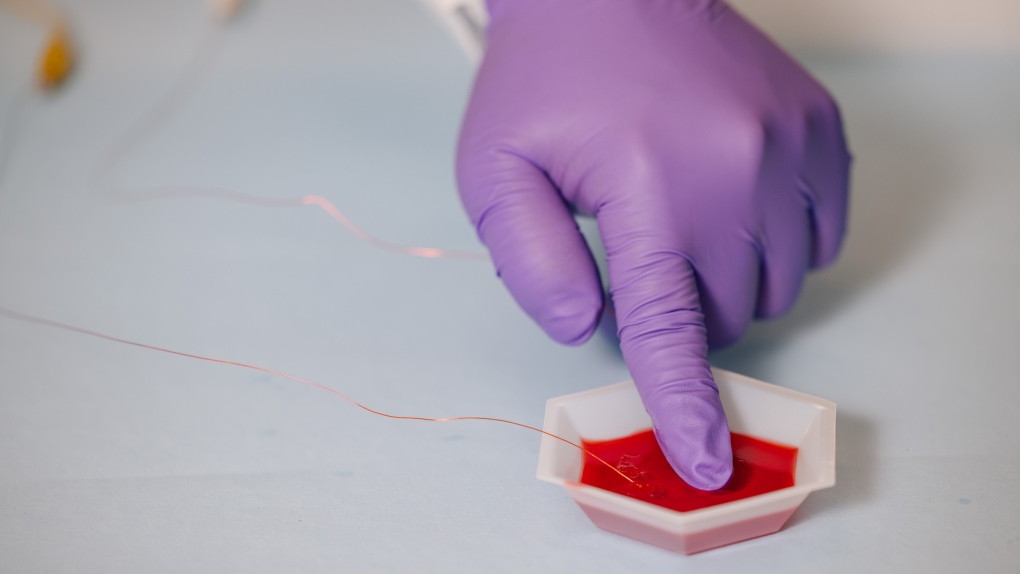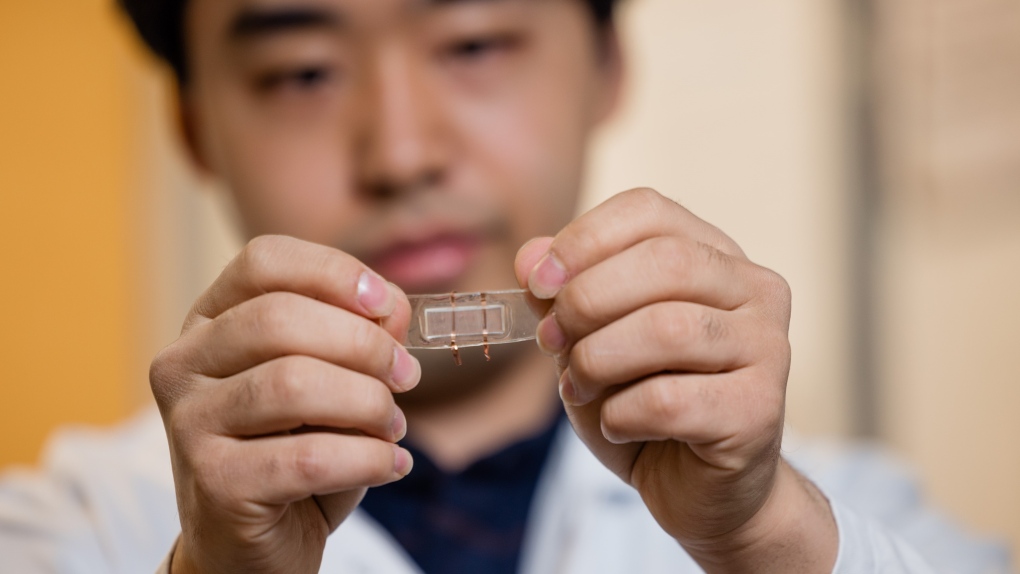How jelly is playing a role in the creation of a substance that can mimic natural skin
 Researchers use a jelly dessert to demonstrate how ions move in hydrogels. (Kai Jacobson/UBC Faculty of Applied Science)
Researchers use a jelly dessert to demonstrate how ions move in hydrogels. (Kai Jacobson/UBC Faculty of Applied Science)
A group of scientists is working to design a material that can mimic the ability of human skin to sense touch, and they're using a dessert popular with children and hospital cafeterias to do it.
It sounds futuristic, but the research being conducted at the University of British Columbia would offer a wearer of a prosthetic arm or robotic hand a more natural, comfortable feel.
Most so-called "smart skins" are made of metals and plastics, but some, called ionic skins, are made of more flexible materials.
These hydrogels use ions to carry an electrical charge, meaning when they're touched, the "skin" can generate voltages. This was known, according to a news release from UBC summarizing the team's peer-reviewed work that was published Thursday, but what was unclear is how this happened.
So a then-master's student in the biomedical engineering program at the University of British Columbia came up with a way to incorporate different sized hydrogel sensors into the skin.
The student, Yuta Dobashi, then worked with others in the school's physics and chemistry departments to apply magnetic fields. What this did was allow them to monitor how the ions moved.
And to demonstrate this movement, they used an unlikely substance: a jelly dessert, similar to what kids might take to school as a lunchtime treat, or what a hospital might serve its patients.
"When pressure is applied to the gel that pressure spreads out the ions in the liquid at different speeds, creating an electrical signal," Dobashi said in the UBC news release. Dobashi is now completing his PhD in Toronto, but started the work while getting his master's.
Because positive and negative ions, contained in salt inside the sensors, move at different speeds, "this results in an uneven ion distribution, which creates an electric field," he said.
This answered the "how" question scientists had.
For those less familiar with the concept, the researchers said what it means is that these hydrogels used in ionic skins actually work in a similar way to human skin. Ions move then, too, in response to pressure.
It's exciting news for those who see the implications of the work.
According to an electrical and computer engineering professor at UBC who oversaw the work, it means sensors could be created that would be able to interact with the nervous system.
"You can imagine a prosthetic arm covered in an ionic skin. The skin senses an object through touch or pressure, conveys that information through the nerves to the brain, and the brain then activates the motors required to lift or hold the object," John Madden said.
"With further development of the sensor skin and interfaces with nerves, this bionic interface is conceivable."
Another way the science could be used is to monitor a hospital patient's pulse, blood pressure and temperature, rather than the systems used in hospitals currently.
At some point too, these jelly-like materials could be used for implants such as artificial knees and hips, and they could even release drugs based on how much pressure it senses.
The research was published in Science, an academic journal published by the American Association for the Advancement of Science that has been around since the late 1800s.
 Study lead author Yuta Dobashi, a graduate of UBC's master in biomedical engineering program, is shown. (Kai Jacobson / UBC Faculty of Applied Science)
Study lead author Yuta Dobashi, a graduate of UBC's master in biomedical engineering program, is shown. (Kai Jacobson / UBC Faculty of Applied Science)
CTVNews.ca Top Stories

Richard Perry, record producer behind 'You're So Vain' and other hits, dies at 82
Richard Perry, a hitmaking record producer with a flair for both standards and contemporary sounds whose many successes included Carly Simon’s 'You’re So Vain,' Rod Stewart’s 'The Great American Songbook' series and a Ringo Starr album featuring all four Beatles, died Tuesday. He was 82.
Hong Kong police issue arrest warrants and bounties for six activists including two Canadians
Hong Kong police on Tuesday announced a fresh round of arrest warrants for six activists based overseas, with bounties set at $1 million Hong Kong dollars for information leading to their arrests.
Read Trudeau's Christmas message
Prime Minister Justin Trudeau issued his Christmas message on Tuesday. Here is his message in full.
Stunning photos show lava erupting from Hawaii's Kilauea volcano
One of the world's most active volcanoes spewed lava into the air for a second straight day on Tuesday.
Indigenous family faced discrimination in North Bay, Ont., when they were kicked off transit bus
Ontario's Human Rights Tribunal has awarded members of an Indigenous family in North Bay $15,000 each after it ruled they were victims of discrimination.
What is flagpoling? A new ban on the practice is starting to take effect
Immigration measures announced as part of Canada's border response to president-elect Donald Trump's 25 per cent tariff threat are starting to be implemented, beginning with a ban on what's known as 'flagpoling.'
Dismiss Trump taunts, expert says after 'churlish' social media posts about Canada
U.S. president-elect Donald Trump and those in his corner continue to send out strong messages about Canada.
Heavy travel day starts with brief grounding of all American Airlines flights
American Airlines briefly grounded flights nationwide Tuesday because of a technical problem just as the Christmas travel season kicked into overdrive and winter weather threatened more potential problems for those planning to fly or drive.
King Charles III is set to focus on healthcare workers in his traditional Christmas message
King Charles III is expected to use his annual Christmas message to highlight health workers, at the end of a year in which both he and the Princess of Wales were diagnosed with cancer.

































